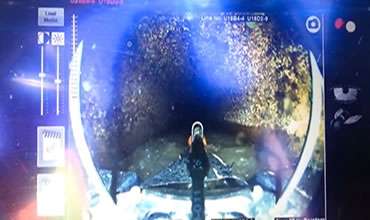Using high-resolution sonar units (which may be skid, float, or robotic tractor mounted) we can survey and fully assess pipelines 10″ to 120″ in diameter, measuring the magnitude of any defects that may be present. This same concept allows our operators to measure debris and sediment depth in pipelines and shafts.
As the scanner is moved through the pipeline, an indication of distance traveled is shown and recorded on the screen. Internal sensors monitor the attitude of the scanning device and is displayed as pitch and roll indicators in analogue and digital form on the screen to show the orientation of the unit.
Features & benefits
- For use in submerged and semi-submerged pipelines ranging from 8″ to 18 feet.
- Used with CCTV to provide simultaneous image of pipe both above and below waterline.
- Provides “real-time” cross-sectional views of the pipe, utilizing high resolution/short range sonar.
- Provides and quantifies accurate dimensional data on silt level, grease accumulation, pipe deformation, offsets, blockages, etc. Below the water line in partially charged lines.
- Sonar inspection provides a two-dimensional profile of the interior pipe wall, much like a medical MRI.
Sonar profiling has proven useful in a variety of applications. Surcharged pipelines, siphons, river crossings, and force mains can be inspected with confidence and without the costly, disruptive and sometimes impossible need for bypass pumping. Hard-copy reports can be supplied, as well as electronic reports that can be opened in almost any computer-aided design software.








